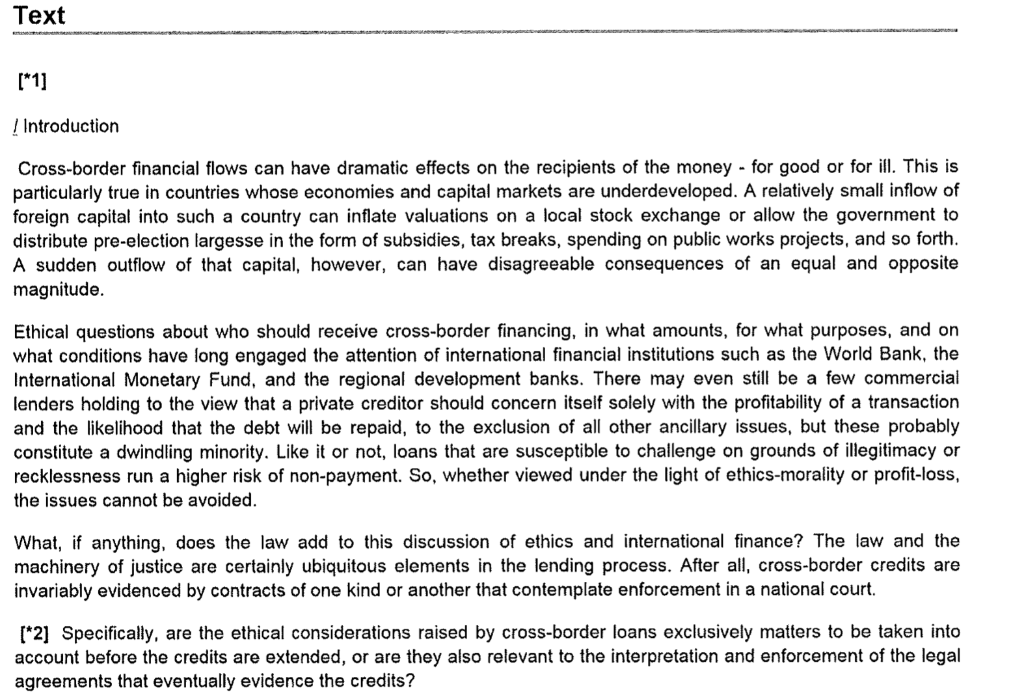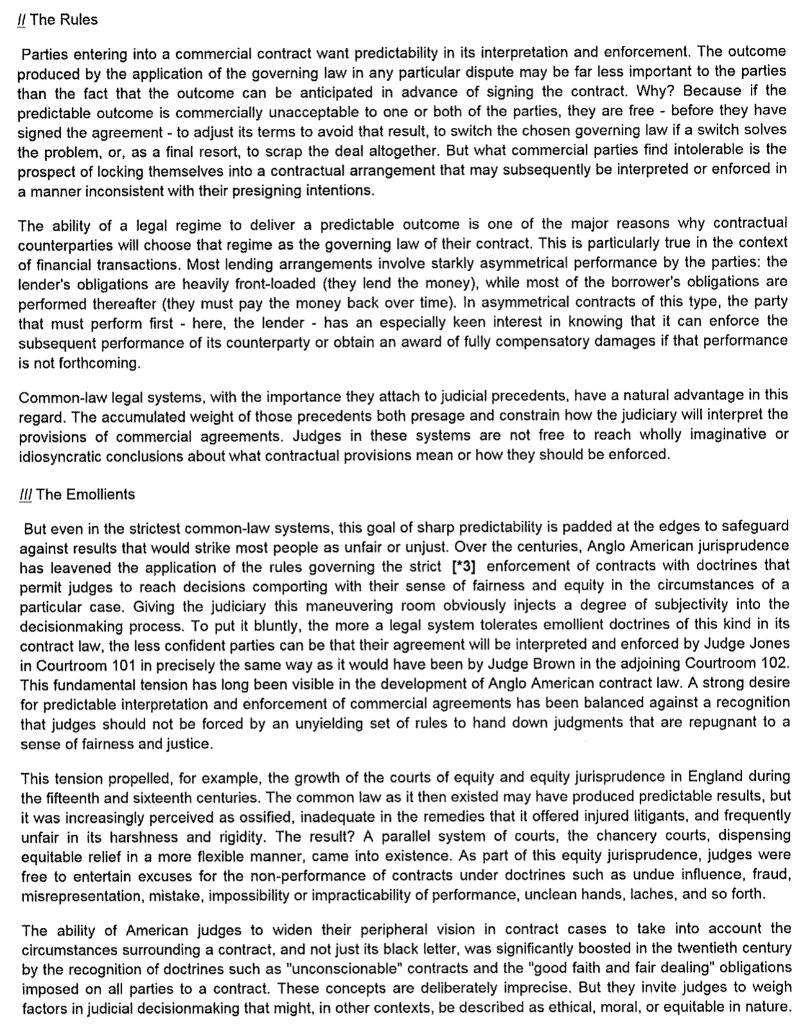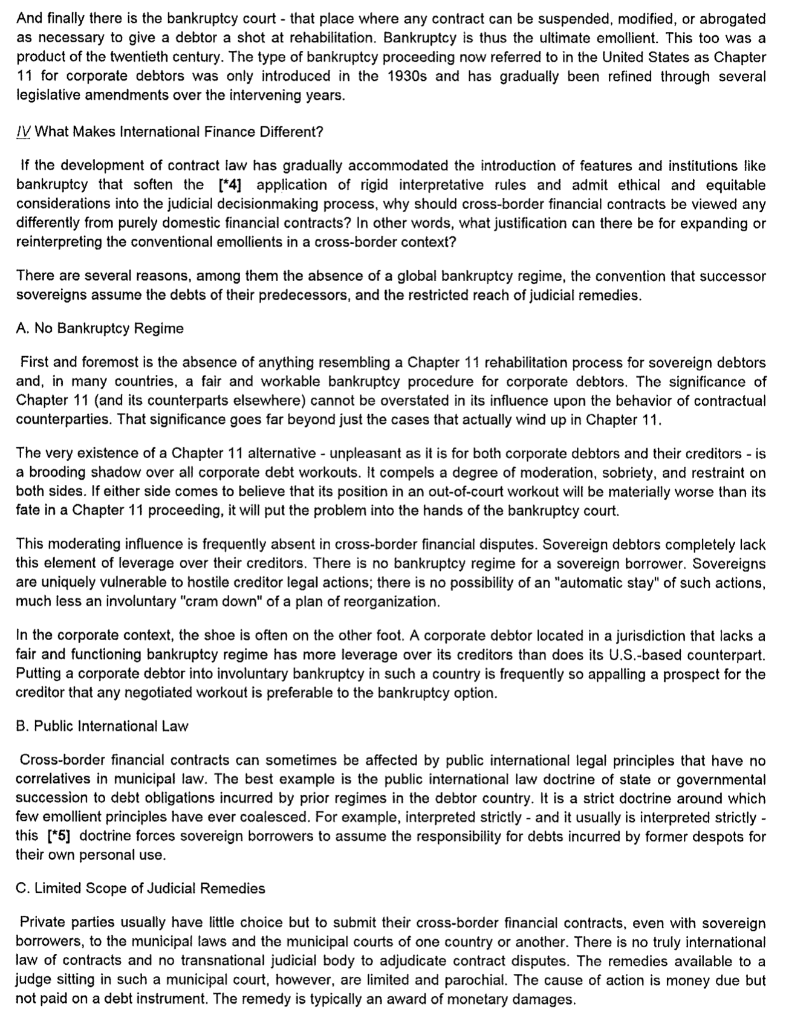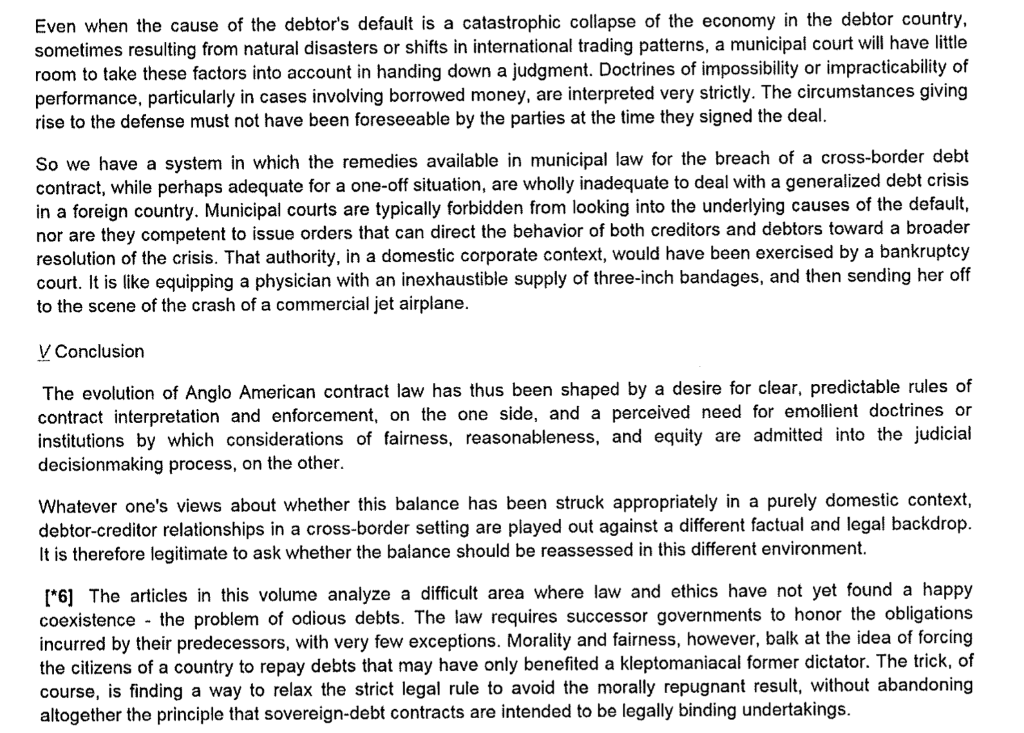Do article review




Text [*1] I Introduction Cross-border financial flows can have dramatic effects on the recipients of the money - for good or for ill. This is particularly true in countries whose economies and capital markets are underdeveloped. A relatively small inflow of foreign capital into such a country can inflate valuations on a local stock exchange or allow the government to distribute pre-election largesse in the form of subsidies, tax breaks, spending on public works projects, and so forth. A sudden outflow of that capital, however, can have disagreeable consequences of an equal and opposite magnitude. Ethical questions about who should receive cross-border financing, in what amounts, for what purposes, and on what conditions have long engaged the attention of international financial institutions such as the World Bank, the International Monetary Fund, and the regional development banks. There may even still be a few commercial lenders holding to the view that a private creditor should concern itself solely with the profitability of a transaction and the likelihood that the debt will be repaid, to the exclusion of all other ancillary issues, but these probably constitute a dwindling minority. Like it or not, loans that are susceptible to challenge on grounds of illegitimacy or recklessness run a higher risk of non-payment. So, whether viewed under the light of ethics-morality or profit-loss, the issues cannot be avoided. What, if anything, does the law add to this discussion of ethics and international finance? The law and the machinery of justice are certainly ubiquitous elements in the lending process. After all, cross-border credits are invariably evidenced by contracts of one kind or another that contemplate enforcement in a national court. [*2] Specifically, are the ethical considerations raised by cross-border loans exclusively matters to be taken into account before the credits are extended, or are they also relevant to the interpretation and enforcement of the legal agreements that eventually evidence the credits? // The Rules Parties entering into a commercial contract want predictability in its interpretation and enforcement. The outcome produced by the application of the governing law in any particular dispute may be far less important to the parties than the fact that the outcome can be anticipated in advance of signing the contract. Why? Because if the predictable outcome is commercially unacceptable to one or both of the parties, they are free - before they have signed the agreement - to adjust its terms to avoid that result, to switch the chosen governing law if a switch solves the problem, or, as a final resort, to scrap the deal altogether. But what commercial parties find intolerable is the prospect of locking themselves into a contractual arrangement that may subsequently be interpreted or enforced in a manner inconsistent with their presigning intentions. The ability of a legal regime to deliver a predictable outcome is one of the major reasons why contractual counterparties will choose that regime as the governing law of their contract. This is particularly true in the context of financial transactions. Most lending arrangements involve starkly asymmetrical performance by the parties: the lender's obligations are heavily front-loaded (they lend the money), while most of the borrower's obligations are performed thereafter (they must pay the money back over time). In asymmetrical contracts of this type, the party that must perform first - here, the lender - has an especially keen interest in knowing that it can enforce the subsequent performance of its counterparty or obtain an award of fully compensatory damages if that performance is not forthcoming. Common-law legal systems, with the importance they attach to judicial precedents, have a natural advantage in this regard. The accumulated weight of those precedents both presage and constrain how the judiciary will interpret the provisions of commercial agreements. Judges in these systems are not free to reach wholly imaginative or idiosyncratic conclusions about what contractual provisions mean or how they should be enforced. III The Emollients But even in the strictest common-law systems, this goal of sharp predictability is padded at the edges to safeguard against results that would strike most people as unfair or unjust. Over the centuries, Anglo American jurisprudence has leavened the application of the rules governing the strict [*3] enforcement of contracts with doctrines that permit judges to reach decisions comporting with their sense of fairness and equity in the circumstances of a particular case. Giving the judiciary this maneuvering room obviously injects a degree of subjectivity into the decisionmaking process. To put it bluntly, the more a legal system tolerates emollient doctrines of this kind in its contract law, the less confident parties can be that their agreement will be interpreted and enforced by Judge Jones in Courtroom 101 in precisely the same way as it would have been by Judge Brown in the adjoining Courtroom 102. This fundamental tension has long been visible in the development of Anglo American contract law. A strong desire for predictable interpretation and enforcement of commercial agreements has been balanced against a recognition that judges should not be forced by an unyielding set of rules to hand down judgments that are repugnant to a sense of fairness and justice. This tension propelled, for example, the growth of the courts of equity and equity jurisprudence in England during the fifteenth and sixteenth centuries. The common law as it then existed may have produced predictable results, but it was increasingly perceived as ossified, inadequate in the remedies that it offered injured litigants, and frequently unfair in its harshness and rigidity. The result? A parallel system of courts, the chancery courts, dispensing equitable relief in a more flexible manner, came into existence. As part of this equity jurisprudence, judges were free to entertain excuses for the non-performance contracts under octri as undue fraud, misrepresentation, mistake, impossibility or impracticability of performance, unclean hands, laches, and so forth. The ability of American judges to widen their peripheral vision in contract cases to take into account the circumstances surrounding a contract, and not just its black letter, was significantly boosted in the twentieth century by the recognition of doctrines such as "unconscionable" contracts and the "good faith and fair dealing" obligations imposed on all parties to a contract. These concepts are deliberately imprecise. But they invite judges to weigh factors in judicial decisionmaking that might, in other contexts, be described as ethical, moral, or equitable in nature. And finally there is the bankruptcy court - that place where any contract can be suspended, modified, or abrogated as necessary to give a debtor a shot at rehabilitation. Bankruptcy is thus the ultimate emollient. This too was a product of the twentieth century. The type of bankruptcy proceeding now referred to in the United States as Chapter 11 for corporate debtors was only introduced in the 1930s and has gradually been refined through several legislative amendments over the intervening years. IV What Makes International Finance Different? If the development of contract law has gradually accommodated the introduction of features and institutions like bankruptcy that soften the [*4] application of rigid interpretative rules and admit ethical and equitable considerations into the judicial decisionmaking process, why should cross-border financial contracts be viewed any differently from purely domestic financial contracts? In other words, what justification can there be for expanding or reinterpreting the conventional emollients in a cross-border context? There are several reasons, among them the absence of a global bankruptcy regime, the convention that successor sovereigns assume the debts of their predecessors, and the restricted reach of judicial remedies. A. No Bankruptcy Regime First and foremost is the absence of anything resembling a Chapter 11 rehabilitation process for sovereign debtors and, in many countries, a fair and workable bankruptcy procedure for corporate debtors. The significance of Chapter 11 (and its counterparts elsewhere) cannot be overstated in its influence upon the behavior of contractual counterparties. That significance goes far beyond just the cases that actually wind up in Chapter 11. The very existence of a Chapter 11 alternative - unpleasant as it is for both corporate debtors and their creditors - is a brooding shadow over all corporate debt workouts. It compels a degree of moderation, sobriety, and restraint on both sides. If either side comes to believe that its position in an out-of-court workout will be materially worse than its fate in a Chapter 11 proceeding, it will put the problem into the hands of the bankruptcy court. This moderating influence is frequently absent in cross-border financial disputes. Sovereign debtors completely lack this element of leverage over their creditors. There is no bankruptcy regime for a sovereign borrower. Sovereigns are uniquely vulnerable to hostile creditor legal actions; there is no possibility of an "automatic stay" of such actions, much less an involuntary "cram down" of a plan of reorganization In the corporate context, the shoe is often on the other foot. A corporate debtor located in a jurisdiction that lacks a fair and functioning bankruptcy regime has more leverage over its creditors than does its U.S.-based counterpart. Putting a corporate debtor into involuntary bankruptcy in such a country is frequently so appalling a prospect for the creditor that any negotiated workout is preferable to the bankruptcy option. B. Public International Law Cross-border financial contracts can sometimes be affected by public international legal principles that have no correlatives in municipal law. The best example is the public international law doctrine of state or governmental succession to debt obligations incurred by prior regimes in the debtor country. It is a strict doctrine around which few emollient principles have ever coalesced. For example, interpreted strictly - and it usually is interpreted strictly - this [*5] doctrine forces sovereign borrowers to assume the responsibility for debts incurred by former despots for their own personal use. C. Limited Scope of Judicial Remedies Private parties usually have little choice but to submit their cross-border financial contracts, even with sovereign borrowers, to the municipal laws and the municipal courts of one country or another. There is no truly international law of contracts and no transnational judicial body to adjudicate contract disputes. The remedies available to a judge sitting in such a municipal court, however, are limited and parochial. The cause of action is money due but not paid on a debt instrument. The remedy is typically an award of monetary damages. Even when the cause of the debtor's default is a catastrophic collapse of the economy in the debtor country, sometimes resulting from natural disasters or shifts in international trading patterns, a municipal court will have little room to take these factors into account in handing down a judgment. Doctrines of impossibility or impracticability of performance, particularly in cases involving borrowed money, are interpreted very strictly. The circumstances giving rise to the defense must not have been foreseeable by the parties at the time they signed the deal. So we have a system in which the remedies available in municipal law for the breach of a cross-border debt contract, while perhaps adequate for a one-off situation, are wholly inadequate to deal with a generalized debt crisis in a foreign country. Municipal courts are typically forbidden from looking into the underlying causes of the default, nor are they competent to issue orders that can direct the behavior of both creditors and debtors toward a broader resolution of the crisis. That authority, in a domestic corporate context, would have been exercised by a bankruptcy court. It is like equipping a physician with an inexhaustible supply of three-inch bandages, and then sending her off to the scene of the crash of a commercial jet airplane. V Conclusion The evolution of Anglo American contract law has thus been shaped by a desire for clear, predictable rules of contract interpretation and enforcement, on the one side, and a perceived need for emollient doctrines or institutions by which considerations of fairness, reasonableness, and equity are admitted into the judicial decisionmaking process, on the er. Whatever one's views about whether this balance has been struck appropriately in a purely domestic context, debtor-creditor relationships in a cross-border setting are played out against a different factual and legal backdrop. It is therefore legitimate to ask whether the balance should be reassessed in this different environment. [*6] The articles in this volume analyze a difficult area where law and ethics have not yet found a happy coexistence - the problem of odious debts. The law requires successor governments to honor the obligations incurred by their predecessors, with very few exceptions. Morality and fairness, however, balk at the idea of forcing the citizens of a country to repay debts that may have only benefited a kleptomaniacal former dictator. The trick, of course, is finding a way to relax the strict legal rule to avoid the morally repugnant result, without abandoning altogether the principle that sovereign-debt contracts are intended to be legally binding undertakings. Text [*1] I Introduction Cross-border financial flows can have dramatic effects on the recipients of the money - for good or for ill. This is particularly true in countries whose economies and capital markets are underdeveloped. A relatively small inflow of foreign capital into such a country can inflate valuations on a local stock exchange or allow the government to distribute pre-election largesse in the form of subsidies, tax breaks, spending on public works projects, and so forth. A sudden outflow of that capital, however, can have disagreeable consequences of an equal and opposite magnitude. Ethical questions about who should receive cross-border financing, in what amounts, for what purposes, and on what conditions have long engaged the attention of international financial institutions such as the World Bank, the International Monetary Fund, and the regional development banks. There may even still be a few commercial lenders holding to the view that a private creditor should concern itself solely with the profitability of a transaction and the likelihood that the debt will be repaid, to the exclusion of all other ancillary issues, but these probably constitute a dwindling minority. Like it or not, loans that are susceptible to challenge on grounds of illegitimacy or recklessness run a higher risk of non-payment. So, whether viewed under the light of ethics-morality or profit-loss, the issues cannot be avoided. What, if anything, does the law add to this discussion of ethics and international finance? The law and the machinery of justice are certainly ubiquitous elements in the lending process. After all, cross-border credits are invariably evidenced by contracts of one kind or another that contemplate enforcement in a national court. [*2] Specifically, are the ethical considerations raised by cross-border loans exclusively matters to be taken into account before the credits are extended, or are they also relevant to the interpretation and enforcement of the legal agreements that eventually evidence the credits? // The Rules Parties entering into a commercial contract want predictability in its interpretation and enforcement. The outcome produced by the application of the governing law in any particular dispute may be far less important to the parties than the fact that the outcome can be anticipated in advance of signing the contract. Why? Because if the predictable outcome is commercially unacceptable to one or both of the parties, they are free - before they have signed the agreement - to adjust its terms to avoid that result, to switch the chosen governing law if a switch solves the problem, or, as a final resort, to scrap the deal altogether. But what commercial parties find intolerable is the prospect of locking themselves into a contractual arrangement that may subsequently be interpreted or enforced in a manner inconsistent with their presigning intentions. The ability of a legal regime to deliver a predictable outcome is one of the major reasons why contractual counterparties will choose that regime as the governing law of their contract. This is particularly true in the context of financial transactions. Most lending arrangements involve starkly asymmetrical performance by the parties: the lender's obligations are heavily front-loaded (they lend the money), while most of the borrower's obligations are performed thereafter (they must pay the money back over time). In asymmetrical contracts of this type, the party that must perform first - here, the lender - has an especially keen interest in knowing that it can enforce the subsequent performance of its counterparty or obtain an award of fully compensatory damages if that performance is not forthcoming. Common-law legal systems, with the importance they attach to judicial precedents, have a natural advantage in this regard. The accumulated weight of those precedents both presage and constrain how the judiciary will interpret the provisions of commercial agreements. Judges in these systems are not free to reach wholly imaginative or idiosyncratic conclusions about what contractual provisions mean or how they should be enforced. III The Emollients But even in the strictest common-law systems, this goal of sharp predictability is padded at the edges to safeguard against results that would strike most people as unfair or unjust. Over the centuries, Anglo American jurisprudence has leavened the application of the rules governing the strict [*3] enforcement of contracts with doctrines that permit judges to reach decisions comporting with their sense of fairness and equity in the circumstances of a particular case. Giving the judiciary this maneuvering room obviously injects a degree of subjectivity into the decisionmaking process. To put it bluntly, the more a legal system tolerates emollient doctrines of this kind in its contract law, the less confident parties can be that their agreement will be interpreted and enforced by Judge Jones in Courtroom 101 in precisely the same way as it would have been by Judge Brown in the adjoining Courtroom 102. This fundamental tension has long been visible in the development of Anglo American contract law. A strong desire for predictable interpretation and enforcement of commercial agreements has been balanced against a recognition that judges should not be forced by an unyielding set of rules to hand down judgments that are repugnant to a sense of fairness and justice. This tension propelled, for example, the growth of the courts of equity and equity jurisprudence in England during the fifteenth and sixteenth centuries. The common law as it then existed may have produced predictable results, but it was increasingly perceived as ossified, inadequate in the remedies that it offered injured litigants, and frequently unfair in its harshness and rigidity. The result? A parallel system of courts, the chancery courts, dispensing equitable relief in a more flexible manner, came into existence. As part of this equity jurisprudence, judges were free to entertain excuses for the non-performance contracts under octri as undue fraud, misrepresentation, mistake, impossibility or impracticability of performance, unclean hands, laches, and so forth. The ability of American judges to widen their peripheral vision in contract cases to take into account the circumstances surrounding a contract, and not just its black letter, was significantly boosted in the twentieth century by the recognition of doctrines such as "unconscionable" contracts and the "good faith and fair dealing" obligations imposed on all parties to a contract. These concepts are deliberately imprecise. But they invite judges to weigh factors in judicial decisionmaking that might, in other contexts, be described as ethical, moral, or equitable in nature. And finally there is the bankruptcy court - that place where any contract can be suspended, modified, or abrogated as necessary to give a debtor a shot at rehabilitation. Bankruptcy is thus the ultimate emollient. This too was a product of the twentieth century. The type of bankruptcy proceeding now referred to in the United States as Chapter 11 for corporate debtors was only introduced in the 1930s and has gradually been refined through several legislative amendments over the intervening years. IV What Makes International Finance Different? If the development of contract law has gradually accommodated the introduction of features and institutions like bankruptcy that soften the [*4] application of rigid interpretative rules and admit ethical and equitable considerations into the judicial decisionmaking process, why should cross-border financial contracts be viewed any differently from purely domestic financial contracts? In other words, what justification can there be for expanding or reinterpreting the conventional emollients in a cross-border context? There are several reasons, among them the absence of a global bankruptcy regime, the convention that successor sovereigns assume the debts of their predecessors, and the restricted reach of judicial remedies. A. No Bankruptcy Regime First and foremost is the absence of anything resembling a Chapter 11 rehabilitation process for sovereign debtors and, in many countries, a fair and workable bankruptcy procedure for corporate debtors. The significance of Chapter 11 (and its counterparts elsewhere) cannot be overstated in its influence upon the behavior of contractual counterparties. That significance goes far beyond just the cases that actually wind up in Chapter 11. The very existence of a Chapter 11 alternative - unpleasant as it is for both corporate debtors and their creditors - is a brooding shadow over all corporate debt workouts. It compels a degree of moderation, sobriety, and restraint on both sides. If either side comes to believe that its position in an out-of-court workout will be materially worse than its fate in a Chapter 11 proceeding, it will put the problem into the hands of the bankruptcy court. This moderating influence is frequently absent in cross-border financial disputes. Sovereign debtors completely lack this element of leverage over their creditors. There is no bankruptcy regime for a sovereign borrower. Sovereigns are uniquely vulnerable to hostile creditor legal actions; there is no possibility of an "automatic stay" of such actions, much less an involuntary "cram down" of a plan of reorganization In the corporate context, the shoe is often on the other foot. A corporate debtor located in a jurisdiction that lacks a fair and functioning bankruptcy regime has more leverage over its creditors than does its U.S.-based counterpart. Putting a corporate debtor into involuntary bankruptcy in such a country is frequently so appalling a prospect for the creditor that any negotiated workout is preferable to the bankruptcy option. B. Public International Law Cross-border financial contracts can sometimes be affected by public international legal principles that have no correlatives in municipal law. The best example is the public international law doctrine of state or governmental succession to debt obligations incurred by prior regimes in the debtor country. It is a strict doctrine around which few emollient principles have ever coalesced. For example, interpreted strictly - and it usually is interpreted strictly - this [*5] doctrine forces sovereign borrowers to assume the responsibility for debts incurred by former despots for their own personal use. C. Limited Scope of Judicial Remedies Private parties usually have little choice but to submit their cross-border financial contracts, even with sovereign borrowers, to the municipal laws and the municipal courts of one country or another. There is no truly international law of contracts and no transnational judicial body to adjudicate contract disputes. The remedies available to a judge sitting in such a municipal court, however, are limited and parochial. The cause of action is money due but not paid on a debt instrument. The remedy is typically an award of monetary damages. Even when the cause of the debtor's default is a catastrophic collapse of the economy in the debtor country, sometimes resulting from natural disasters or shifts in international trading patterns, a municipal court will have little room to take these factors into account in handing down a judgment. Doctrines of impossibility or impracticability of performance, particularly in cases involving borrowed money, are interpreted very strictly. The circumstances giving rise to the defense must not have been foreseeable by the parties at the time they signed the deal. So we have a system in which the remedies available in municipal law for the breach of a cross-border debt contract, while perhaps adequate for a one-off situation, are wholly inadequate to deal with a generalized debt crisis in a foreign country. Municipal courts are typically forbidden from looking into the underlying causes of the default, nor are they competent to issue orders that can direct the behavior of both creditors and debtors toward a broader resolution of the crisis. That authority, in a domestic corporate context, would have been exercised by a bankruptcy court. It is like equipping a physician with an inexhaustible supply of three-inch bandages, and then sending her off to the scene of the crash of a commercial jet airplane. V Conclusion The evolution of Anglo American contract law has thus been shaped by a desire for clear, predictable rules of contract interpretation and enforcement, on the one side, and a perceived need for emollient doctrines or institutions by which considerations of fairness, reasonableness, and equity are admitted into the judicial decisionmaking process, on the er. Whatever one's views about whether this balance has been struck appropriately in a purely domestic context, debtor-creditor relationships in a cross-border setting are played out against a different factual and legal backdrop. It is therefore legitimate to ask whether the balance should be reassessed in this different environment. [*6] The articles in this volume analyze a difficult area where law and ethics have not yet found a happy coexistence - the problem of odious debts. The law requires successor governments to honor the obligations incurred by their predecessors, with very few exceptions. Morality and fairness, however, balk at the idea of forcing the citizens of a country to repay debts that may have only benefited a kleptomaniacal former dictator. The trick, of course, is finding a way to relax the strict legal rule to avoid the morally repugnant result, without abandoning altogether the principle that sovereign-debt contracts are intended to be legally binding undertakings










